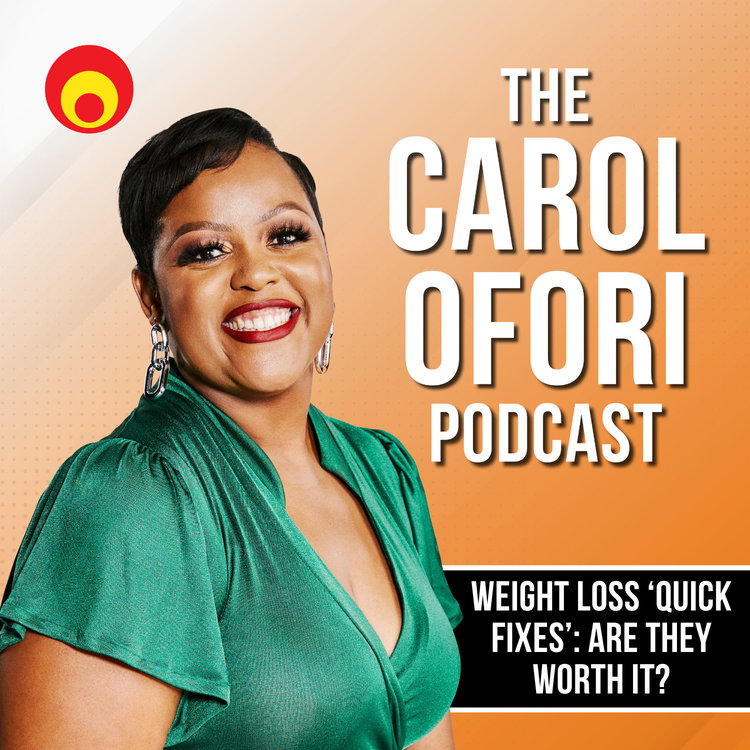
Weight loss 'quick fixes' and off-label drugs: Are they worth it?
Loading player...
In this episode of The Carol Ofori Podcast, Carol investigates a drug, initially developed to manage type 2 diabetes, but now also gaining global popularity as a weight loss solution.
There’s a new weight loss craze that’s taking the world by storm, with many people reporting great success.
It is a medication used to treat patients diagnosed with type 2 diabetes, but is now also being used for weight loss, with many doctors prescribing it “off label” for this purpose.
As a result of its indiscriminate and ‘off-label’ use, we are not allowed to use the name of the drug, but can tell you it is a semaglutide, and is from a class of medicines called GLP-1s.
It is usually administered as a daily or weekly injection.
Well-known international celebs such as Oprah Winfrey, Sharon Osbourne, Elon Musk and Khloe Kardashian have all been linked to this drug, and as a result, arguably contributing towards its popularity.
So, Carol decided to go on a fact finding mission on The Carol Ofori Podcast.
In the first part of this episode, Carol speaks to two people who have direct experience with using this drug for weight loss, 48-year-old Robynne Fitzpatrick and her son, 19-year-old Michael. Michael’s father, Chris Fitzpatrick, who is a sports nutritionist and former body builder, also joins the conversation.
To provide a balanced perspective, Carol then seeks the professional opinion of Dr. Sundeep Ruder, an endocrinologist with an extensive background in the field.
Dr. Ruder delves into the science behind GLP-1s, their role in weight management, and the ethical considerations surrounding their off-label application for weight loss.
Dr Ruder also emphasises the importance of looking beyond medication to address the root causes of obesity, advocating for a holistic approach to health and well-being.
Disclaimer: The content provided in this podcast is for informational purposes only. It is not intended to be a substitute for professional medical advice, diagnosis, or treatment. Always seek the advice of your physician or other qualified health provider with any questions you may have regarding a medical condition. Never disregard professional medical advice or delay in seeking it because of something you have heard on this podcast. Reliance on any information provided by this podcast is solely at your own risk.
There’s a new weight loss craze that’s taking the world by storm, with many people reporting great success.
It is a medication used to treat patients diagnosed with type 2 diabetes, but is now also being used for weight loss, with many doctors prescribing it “off label” for this purpose.
As a result of its indiscriminate and ‘off-label’ use, we are not allowed to use the name of the drug, but can tell you it is a semaglutide, and is from a class of medicines called GLP-1s.
It is usually administered as a daily or weekly injection.
Well-known international celebs such as Oprah Winfrey, Sharon Osbourne, Elon Musk and Khloe Kardashian have all been linked to this drug, and as a result, arguably contributing towards its popularity.
So, Carol decided to go on a fact finding mission on The Carol Ofori Podcast.
In the first part of this episode, Carol speaks to two people who have direct experience with using this drug for weight loss, 48-year-old Robynne Fitzpatrick and her son, 19-year-old Michael. Michael’s father, Chris Fitzpatrick, who is a sports nutritionist and former body builder, also joins the conversation.
To provide a balanced perspective, Carol then seeks the professional opinion of Dr. Sundeep Ruder, an endocrinologist with an extensive background in the field.
Dr. Ruder delves into the science behind GLP-1s, their role in weight management, and the ethical considerations surrounding their off-label application for weight loss.
Dr Ruder also emphasises the importance of looking beyond medication to address the root causes of obesity, advocating for a holistic approach to health and well-being.
Disclaimer: The content provided in this podcast is for informational purposes only. It is not intended to be a substitute for professional medical advice, diagnosis, or treatment. Always seek the advice of your physician or other qualified health provider with any questions you may have regarding a medical condition. Never disregard professional medical advice or delay in seeking it because of something you have heard on this podcast. Reliance on any information provided by this podcast is solely at your own risk.





